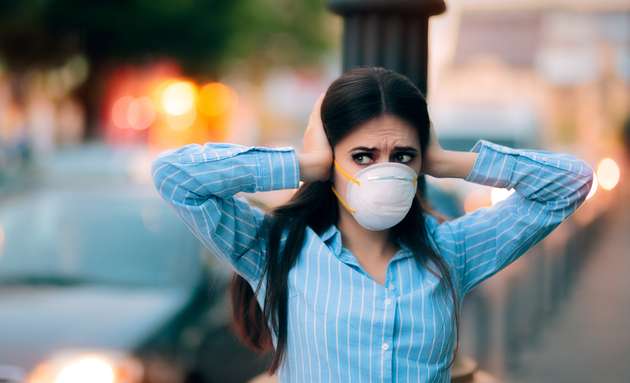Is Noise Pollution Affecting More Than Just Our Heart Health?

1 billion people are at a high risk of losing their hearing permanently due to noise pollution in India. But that’s not all that noise pollution can do to your health.
From heart disease to hearing loss, noise pollution is showing grave consequences to your overall health and well being.
So, what is noise pollution, and what are the health hazards it poses? How can we stay safe from it? Let’s find out.
What is Noise Pollution?

Noise pollution is the exposure of noise at harmful decibels that can have adverse effects on humans and wildlife, and is also known as environmental or sound pollution.
According to the World Health Organisation (WHO), noise exposure below 70 dB does not pose any health risks to human beings or wildlife. However, if someone is exposed to noise levels of 85dB or more for more than 8 hours on a regular basis, it can be considered hazardous.
What Are the Sources of Noise Pollution?
From transportation noise to your neighbourhood religious site - there are multiple sources of noise pollution that contribute to your ill health. Let’s take a look at the highest contributors:
-
Transportation

Road traffic, aeroplanes or jets, and trains produce a large amount of noise. Exposure to such noises on a regular basis for long periods of time have proved detrimental to health in more ways than one.
-
Industrialisation
From large machineries to equipment like compressors, generators, exhaust fans, and grinding mills produce a lot of noise, making it a major contributor to noise pollution.
-
Construction

Construction activities due to rapid urbanisation and industrialisation has played a major role in increasing noise pollution in India. According to data, Delhi and Mumbai record the highest noise pollution levels.
-
Household Appliances
From refrigerators to mixer grinders - most of our kitchen and household appliances are responsible for noise pollution.
-
Religious/Social/Cultural Programs

The use of loudspeakers is not an unknown concept to Indians. Be it a festival, or a cultural program, loudspeakers and firecrackers end up contributing to noise pollution.
“According to a review article in the Feb. 13, 2018, Journal of the American College of Cardiology, many studies have observed a connection between transportation-related noise and a slightly higher risk of high blood pressure, coronary artery disease, stroke, and heart failure.”
How Does Noise Pollution Affect Our Health?
Sounds are an integral part of our lives. But if sound becomes noise, it poses threats to different aspects of our health. Let’s look at how noise pollution can affect our health:
-
Cardiovascular Health
Loud, unexpected noises can trigger your body’s stress response, setting off an alarm system. This results in a surge of stress hormones adrenaline and cortisol - which can constrict your arteries and raise your blood pressure.
“Noise pollution may increase the risk of heart disease, including coronary artery disease, hypertension, and heart failure.” - according to a study by the Journal of the American College of Cardiology.
Being exposed to noise pollution for ten years or more can increase your risk of developing cardiovascular diseases by 300%.
-
Hearing

Any noise above 85dB for more than 8 hours a day can greatly damage your hearing.
Usually, hearing loss due to noise pollution is accompanied by loudness recruitment - a physical condition that results in reduced tolerance of loudness. In such cases, some sounds may seem distorted, a condition called paracusis, or cause tinnitus - a condition in which sounds are emitted by the inner ear itself.
According to the Indian census, almost 1% of the Indian population is living with a hearing impairment, which is approximately 1.3 million people.
-
Cognitive Decline
Exposure to noise pollution has been associated with an early onset of cognitive decline, either due to a stroke or a predisposition for Alzheimer’s Disease. Learn more about Alzheimer’s Disease here.
-
Reproductive Health

If you’re exposed to consistent loud noise while you’re pregnant, your baby may be at a risk of hearing impairment. High levels of noise can increase stress levels in your body, which can reach the baby in the womb and cause hearing impairment at a later stage.
-
Psychological Effects
Noise pollution triggers the body’s stress response, eventually leading to chronic stress. Chronic stress can lower your immunity, making you susceptible to other diseases. Noise pollution can also cause sleep disturbances and give you headaches, making you cranky, and fatigued.
How Can You Protect Yourself from Noise Pollution?

Health effects due to noise pollution is a growing area of public concern. The WHO has outlined a standard for safe listening on gadgets that call for volume limiting to track the duration of damaging sound exposure.
There are plenty of mobile applications that serve the purpose. For other times, here are some tips to keep yourself away from the harmful effects of noise pollution:
- Use good quality noise cancellation headphones and keep your music levels low. (not more than 60dB)
- In your home, place foam below kitchen appliances to absorb the sounds
- When you’re driving, ensure you do not honk unnecessarily
- When at parties or cultural programs, ensure sound levels don’t cross their limits




